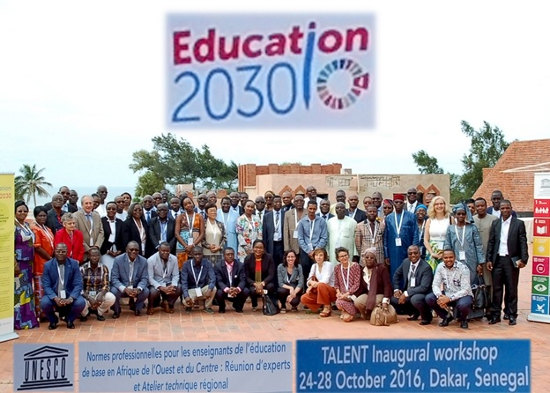Regional workshop on professional standards for basic education teachers in West and Central Africa: TALENT1/SDG4 Network Inauguration
From the 26th- 28th October 2016, UNESCO-IICBA participated in the inaugural launch of the Teaching and Learning Educator’s Network for Transformation (TALENT) and the SDG4 Regional Workshop on Professional Standards for Basic Education teachers in West and Central Africa. The workshop, held in Dakar, Senegal, was convened to find ways to achieve the SDG4 Framework for Action, which calls upon governments to significantly increase the number of qualified teachers by 2030.

“Today has come the time to capitalize on the efforts of UNESCO and several other partner agencies which are here today (EI, ADEA, CONFEMEN, UNICEF, UNHCR) and propose to the African countries a resource package in addressing the teachers’ professionalization in terms of standards and a common vision of the basic education as a continuum and a block,” commented IICBA’s Director, Dr. Yumiko Yokozeki during her opening speech.
To this end, the Workshop set for itself the primary aim of developing: (i) Qualification Framework for teachers, teacher trainers, teacher supervisors and inspectors, by defining common professional standards for teachers and allowing mutual recognition of these teachers’ qualifications: (ii) and a common regional curriculum framework for basic education teacher training. This would allow for both academic and professional mobility in both regions, as well as support the regional integration process.
During the workshops, IICBA Program Specialist Mr. Omar Diop presented the new policy-tool on teachers, “Teaching and learning outcomes in Sub Saharan Africa: Issues and Options” and the African joint recommendations on teachers an outcome of the celebration of the 50th anniversary of UNESCO/ILO recommendations on conditions of work of teachers. The way for a future tool on support and motivation of teachers was paved with a great excitement of all.
Along with key development partners, present at the Workshop were representatives from the ECOWAS and ECCAS Secretariat, as well as country representatives from Benin, Burkina Faso, Cabo Verde, Ivory Coast, Gambia, Ghana, Guinea, Guinea Bissau, Liberia, Mali, Niger, Nigeria, Senegal, Sierra Leone, Togo, Angola, Burundi, DRC, Cameroon, Equatorial Guinea, Gabon, CAR, Sao Tome, DRC, Chad, and Rwanda.
The workshop concluded with the adoption of a common resource package for addressing the teachers’ professionalization and a roadmap for technical and political validation of ECOWAS and ECCAS and their member countries.
